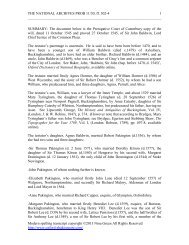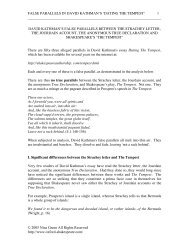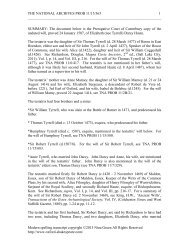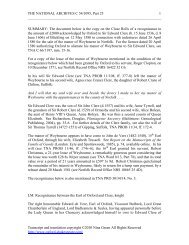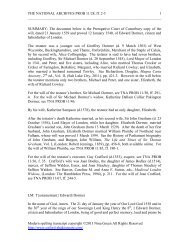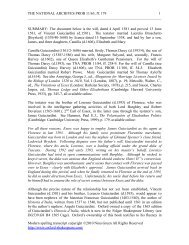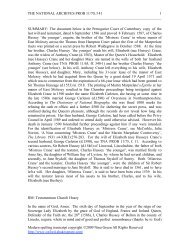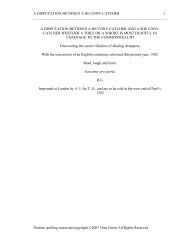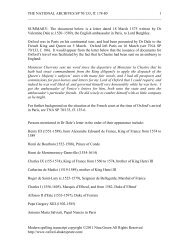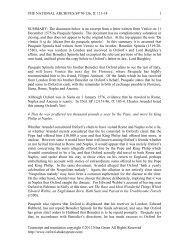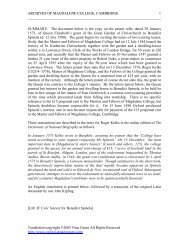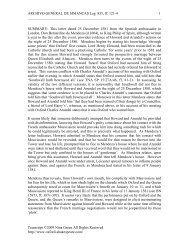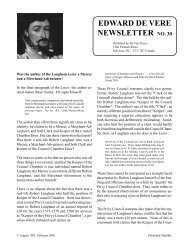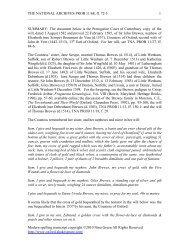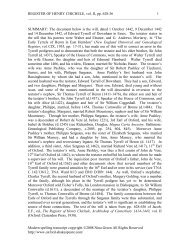GREENE'S FAREWELL TO FOLLY 1 Modern spelling tran
GREENE'S FAREWELL TO FOLLY 1 Modern spelling tran
GREENE'S FAREWELL TO FOLLY 1 Modern spelling tran
You also want an ePaper? Increase the reach of your titles
YUMPU automatically turns print PDFs into web optimized ePapers that Google loves.
GREENE’S <strong>FAREWELL</strong> <strong>TO</strong> <strong>FOLLY</strong> 30<br />
________________________________________________________________________<br />
Carcalla [sic?] was banished his empire for lust, with infinite other whose miseries,<br />
mishaps and misfortunes were innumerable only for this folly, as Tarquinus Superbus for<br />
Lucrece; Appius Claudius for Virginia; Julius Caesar for Cleopatra; John, County<br />
Armiake for his own sister; Anthony Venereus, Duke of Venice, for his secretary’s wife;<br />
Abusahid, King of Fez, for the wife of Cosimo de Cheri, as Leon in his description of<br />
Afric setteth down, but amongst all these, gentles, an history at large for the confirmation<br />
of this my discourse.<br />
The tale of Cosimo<br />
While Ninus, the son of Belus, reigned as sovereign over the dominions of Egypt, and<br />
kept his court royal in Babylon, there dwelled in the suburbs of the city a poor labouring<br />
man called Menon, who was more honest than wealthy, and yet sufficiently rich for that<br />
he lived content amongst his neighbours. This poor man accounted his possessions large<br />
enough as long as he enjoyed and possessed his ground in quiet, imitating Cincinnatus in<br />
his labours, who found health of body and quiet of mind the chiefest treasure by tilling<br />
his field with continual toil. But as content had satisfied his thoughts in this, so Menon<br />
was as greatly favoured of fortune, for he had a wife of the same degree and parentage, so<br />
beautiful as there was none so fair in Babylon, so honest as there was none more virtuous,<br />
so courteous that there was not one in the whole city who did not both love and like of<br />
Semiramis, the wife of Menon, for so was her name, insomuch that Ninus desired to have<br />
a sight of her beauty, and in disguised apparel went to the poor man’s house, where<br />
seeing such a heavenly saint about her homely housewifery, fitter (as he thought) to be a<br />
paramour for a prince than a wife for a subject, sighed and sorrowed that she was not in<br />
his power to command, yet favouring her for that she was honest, as fancying her for that<br />
she was beautiful, he departed with resolution to be master of his own affections, and not<br />
to deprive the poor man of so great good. After he was returned to the palace, and was<br />
solitary by himself, the idea of her perfection representing a human shape of a heavenly<br />
creature so assaulted his mind with sundry passions that, giving the reins of liberty to his<br />
wanton appetites, he fell into these terms:<br />
Unhappy Ninus, and therefore unhappy because a king and subject to sensuality, shall<br />
the middle of thy years be worse than the prime of thy youth? Shall love conquer that<br />
fortune could never subdue? Shall the heat of affection search that in the fruit that it<br />
could never hurt in the bud? Shalt though govern a kingdom, and canst not subdue thine<br />
own passions? Peace, Ninus; name not so much as love. Race out fancy with silence,<br />
and let the continency of other kings be precedents for thee to direct thy course aright.<br />
Alexander made a conquest of his thoughts when the beauty of Darius’ wife bade him<br />
battle. Cyrus abstained from the sight of Panthea because he would not be intemperate.<br />
Pompey would not speak to the wife of Demetrius, his freeman, for that she was fair.<br />
And what of this, Ninus? Yet had Alexander concubines, Cyrus a leman, and Pompey<br />
was not so chaste but he liked Phrinia, and so mayest thou make a choice of Semiramis.<br />
She is poor, and unfit for a king. Aye but she is fair, and fit for none but a king; love<br />
filleth not the hand with pelf, but the eye with pleasure. She is honest. Truth, but thou art<br />
a monarch, and the weight of a sceptre is able to break the strongest chastity. But that is<br />
<strong>Modern</strong> <strong>spelling</strong> <strong>tran</strong>script copyright 2007 Nina Green All Rights Reserved



